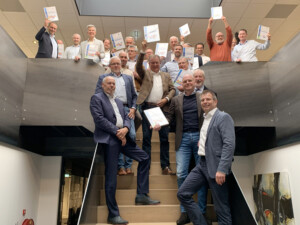VHS members awarded SKG-IKOB Sustainability Passports
The presentation of the SKG-IKOB VHS Sustainability Passports to members of VHS, the Dutch Building Hardware Association (Branchevereniging Hang- en Sluitwerk VHS), is a milestone for hardware manufacturers, paving the way for greater transparency in sustainability reporting. This makes the VHS the first trade association to make a collective effort to improve transparency.
“Together with SKG-IKOB as the independent certification body, we have created a uniform document that helps members to demonstrate which Sustainable Development Goals they meet,” said VHS director Arjen Koole when the Sustainability Passports were awarded at Nauta Group in Barneveld on Wednesday 16 October.
Many VHS members had received an increasing number of requests for information about their companies’ sustainability performance. “We looked for a comprehensible format to make available to all members, at their request. Crucially, the document needed to undergo independent review to prevent the risk of greenwashing,” says Koole.
Kees Verweel, sector coordinator of circular construction at SKG-IKOB, briefly explained the new Sustainability Passport before its presentation. “The passport is based on the Sustainable Development Goals (SDGs) set by the United Nations in 2015. While all 17 SDGs have been included in the passport, we and the VHS decided to start with 14 requirements focused on energy efficiency and circularity.”
The SKG-IKOB VHS Sustainability Passport is proof that an organisation has obtained their SKG-IKOB KOMO attest-with-product certificate following the BRL 3104 assessment guideline. It also provides a summary of the organisation’s sustainability certifications. All certifications are based on the SDGs. They range from an ISO 9001 certification to a Cradle-to-Cradle certification or an Environmental Product Declaration. The passport also records whether solar panels are present. “The passport is a way for organisations to show which sustainability targets they’re working towards,” explains Verweel.
Verweel stresses that SKG-IKOB does not perform any additional assessments of VHS members. “We check whether the members truly have the certifications they claim to have. From now on, SKG-IKOB will perform this inspection annually. The passport is valid for five years, and we’ll audit every year. This independent review will remain a key component of the process.”
The passport is a dynamic document. VHS and SKG-IKOB have agreed that they will annually review whether new requirements should be added to the current 14. “It’s an excellent first step, allowing our members to forge ahead. The document will be subject to constant review to ensure the information it contains remains relevant for the market,” says Koole.
The passports can be accessed upon enquiry with the relevant member or by visiting the SKG-IKOB website (Certificate search – SKG-IKOB Certification, in Dutch).

